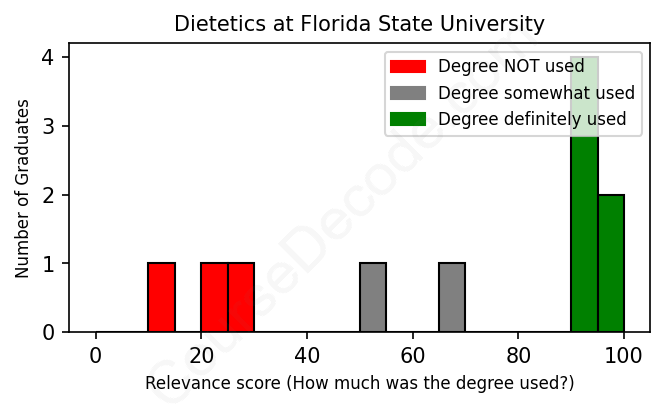
First, some facts. Of the Dietetics graduates from Florida State University we've analyzed , here's how many have used (or NOT used) their degree in their career:

These are estimates based on AI analysis of 11 LinkedIn profiles (see below).
The verdict? On par with the average. Overall, with an average relevance score of 67%, Dietetics graduates from Florida State University have about the same likelihood of finding work in this field as the average graduate across all fields:
And for comparison, here's the chart for all profiles we've looked at across all degrees.
Also, after graduating, 54% of these graduates have pursued further education other than another Bachelor's degree (such as a Masters degree or other), compared to the average across all profiles of 35%. This suggests you may need more than just a Bachelors degree to be competitive as a Dietetics graduate.
See the details:
|
Relevance score: 90% We think this person has gone into a career highly relevant to their degree. We think this person has gone into a career highly relevant to their degree.
DEGREE INFOGraduated in 2016 from Florida State University with a Bachelor of Science (B.S.) in Dietetics. Also pursued further education since (see below). JOB HISTORY SINCE GRADUATIONSports Nutrition Intern Florida State University Jan 2016 - Apr 2016 Textbook Contributor  Nutrition and Health Associates Apr 2016 - Sep 2016 Dietetic Intern  UMass Memorial Medical Center Jun 2017 - Dec 2017 Sales Representative  Orangetheory Fitness Jun 2016 - Jan 2018 Registered Dietitian  Dietitians of Palm Valley Jan 2018 - Apr 2019 Dietitian Consultant  BSN Solutions Apr 2019 - Jan 2020 Founder, The Sorority Nutritionist  [NAME REMOVED] Smith Nutrition LLC Apr 2019 - Present FURTHER DEGREES DONE SINCE GRADUATINGMaster of Science (M.S.)Boston University 2016 - 2018 ABOUTI'm [NAME REMOVED] Hubert MS, RD - Registered Dietitian and founder of the company The Sorority Nutritionist (known as TSN). I founded my private practice back in 2019 to help women learn how to eat for a healthy metabolism and sustainable fat loss. In a world where fad diets and contradicting information on the Internet is always making us believe we need to be restrictive and miserable to lose weight, TSN is disrupting the weight loss space by teaching women how to eat and approach weight loss with a simple, flexible and actually enjoyable approach.I have amassed a social media following of 500,000+ making me an industry leader and sought after Registered Dietitian.My private practice offers supportive personalized coaching and online Membership programs featuring hands on support from Registered Dietitians.I am also the host of the highly charted and ranked podcast Hot, Healthy, Never Hungry where you can find me interviewing incredible guests and sharing my simple and effective weight loss tips for lasting results. My show has 800,000 downloads and counting.For more information about my services visit www.thesororitynutritionist.com today! |
The top 10 most common jobs done by the graduates we've analyzed (ranked most common to least) are:
From reviewing the LinkedIn profiles of Florida State University Dietetics graduates, it's clear that many have gone on to work in roles that aren’t directly related to Dietetics. While some individuals have secured positions like Registered Dietitians or Clinical Dietitians, where they actively apply their nutrition knowledge and dietary assessment skills, others have ventured into vastly different fields. For instance, roles such as Asset Inventory Manager or Operations Manager at large corporations like Nissan don’t require any specific dietetic knowledge, which suggests that many graduates might have drifted away from the core of their education.
Interestingly, the most common jobs among these graduates seem to lean towards management and non-clinical roles, particularly in healthcare settings where their dietetic training might not be fully utilized. Positions like consultation and management in healthcare do involve some healthcare principles, but not necessarily the specialized knowledge tied to Dietetics. However, a notable segment of graduates—those who pursued Dietetic Internships—took paths directly aligned with their studies, gaining experience in clinical settings that effectively employed their education. Unfortunately, those specific dietetic roles appear to be the exception rather than the norm for most of the graduates. Overall, while some have found relevant opportunities, a substantial number have taken on jobs that seem detached from the Dietetics curriculum, raising questions about how well the degree translates into specific career paths.
Here is a visual representation of the most common words in job titles for Dietetics graduates (this is across all Dietetics graduates we've analyzed, not just those who went to Florida State University):

The career trajectories of Dietetics graduates from Florida State University show a mixed bag of outcomes, reflecting both successful paths in the culinary and health sectors and some shifts into unrelated fields. For many, the first job out of school tends to align closely with their degree. Positions like clinical dietitians and nutrition consultants are common starting points, particularly for graduates around 2014 to 2018. This shows a commitment to health and nutrition, which is the core of the dietetics profession.
However, as time goes on—especially around the five to ten-year mark—we see some graduates moving into roles that aren't directly related to dietetics. For instance, some have transitioned into managerial and analytical positions in various companies like Nissan and even into unrelated industries, such as sales and operations. This indicates that while dietetics provides a solid foundation, some graduates are exploring the broader labor market and leveraging their skills in new ways. Overall, while many graduates are finding fulfilling careers related to dietetics, there’s also a noteworthy portion that have branched out into different fields, suggesting a diversified skill set that allows for flexibility in their careers.
A Bachelor degree in Dietetics can be pretty challenging, especially at a school like Florida State University, where the program is designed to be rigorous and comprehensive. Expect to dive into a lot of science classes, like biology, chemistry, and nutrition, which can be tough if you're not super into those subjects. There are also hands-on labs and some clinical components that add to the workload. While it’s not impossible—plenty of students make it through, and it can be super rewarding—be ready to put in some serious effort. So, if you're someone who likes a good challenge and is passionate about health and nutrition, you’ll likely find it interesting, but just know it won’t be a walk in the park.
Most commonly, in the LinkedIn profiles we've looked at, it takes people 4 years to finish a Bachelor degree in Dietetics.
Looking at the careers of these Dietetics graduates from FSU, it seems like there's a mixed bag when it comes to their earnings. Some, like the graduates who transitioned through various roles at Nissan or moved into management positions, likely snagged decent salaries, especially as they climbed the corporate ladder. On the other hand, those starting out with internships or working as dietitians might be earning more modest incomes, typical for entry-level positions in healthcare. But hey, with experience and time, many of them are landing roles that probably come with better pay. Overall, it seems like many of them are on a path to making good money, but it might take a few years to really see that payoff.
Here is a visual representation of the most common words seen in the "about" section of LinkedIn profiles who have a Bachelor degree in Dietetics (this is across all Dietetics graduates we've analyzed, not just those who went to Florida State University). This may or may not be useful:

Here are all colleges offering a Bachelor degree in Dietetics (ordered by the average relevance score of their Dietetics graduates, best to worst) where we have analyzed at least 10 of their graduates:
| College | Score | Count |
|---|---|---|
 University of Delaware University of Delaware
|
87 | 13 |
 Purdue University Purdue University
|
79 | 10 |
 University of Kentucky University of Kentucky
|
76 | 10 |
 Michigan State University Michigan State University
|
74 | 16 |
 Brigham Young University Brigham Young University
|
73 | 12 |
 Iowa State University Iowa State University
|
72 | 13 |
 Florida State University Florida State University
|
67 | 11 |
 Arizona State University Arizona State University
|
65 | 12 |